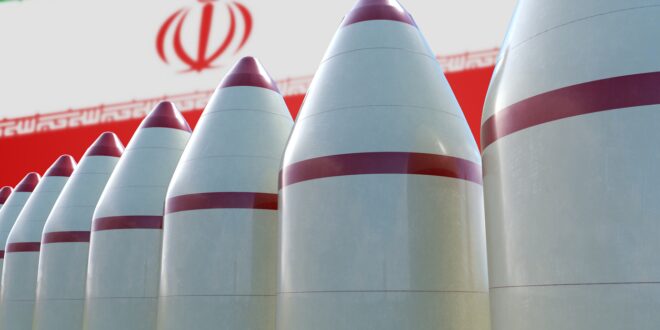After agreeing to extend the monitoring mechanism of the International Atomic Energy Agency (IAEA) by reinstalling surveillance cameras a year ago, Iran then announced that it would not allow the IAEA to see images from the devices.
The Iranian regime is also refusing to answer the IAEA’s questions about uranium particles found at three clandestine and undeclared nuclear sites in Iran.
Nevertheless, the Biden administration has yet to take any tangible action to prevent Iran from becoming a nuclear state…
The Iranian regime has also been setting up weapons factories abroad, and manufacturing ballistic missiles and weapons — include precision-guided missiles with advanced technology — to strike specific targets in other countries, including in Syria.
If the Biden administration would eliminate Iran’s nuclear weapons, the move would not only spare the world from yet another ruthless regime that acts despotically at home and abroad; it would also immediately send Biden’s poll numbers soaring.
The Biden Administration is sitting idly by while Iran’s ruling mullahs continue to advance their nuclear program.
For almost a year and half, the P5+1 (the US, UK, France, Russia and China, plus Germany) have held fruitless negotiations with Iran, all while the Islamic Republic’s theocratic establishment has clearly succeeded at speeding up its nuclear program by increasing its uranium enrichment from 20% to 60%, conducting uranium metal production, and adding additional advanced centrifuges. After agreeing to extend the monitoring mechanism of the International Atomic Energy Agency (IAEA) by reinstalling surveillance cameras a year ago, Iran then announced that it would not allow the IAEA to see images from the devices.
Most importantly, the IAEA announced last month that Iran now has enough enriched uranium to build a nuclear bomb.
The Iranian regime is also refusing to answer the IAEA’s questions about uranium particles found at three clandestine and undeclared nuclear sites in Iran. The IAEA stated:
"Iran has not provided explanations that are technically credible in relation to the Agency's findings at those locations... The Agency remains ready to engage without delay with Iran to resolve all of these matters."The Institute for Science and International Security warned in November 2021:
"Iran has enough enriched uranium hexafluoride (UF6) in the form of near 20 and 60 percent enriched uranium to produce enough weapon-grade uranium (WGU), taken here as 25 kilograms (kg), for a single nuclear weapon in as little as three weeks. It could do so without using any of its stock of uranium enriched up to 5 percent as feedstock. The growth of Iran's stocks of near 20 and 60 percent enriched uranium has dangerously reduced breakout timelines."Nevertheless, the Biden administration has yet to take any tangible action to prevent Iran from becoming a nuclear state in spite of these critical reports, and even though a joint statement issued by the UK, France and Germany acknowledged that “Iran has no credible civilian need for uranium metal R&D and production, which are a key step in the development of a nuclear weapon.”
The Biden administration would do well to understand that if the Islamic Republic becomes a nuclear state, there is the dangerous likelihood of nuclear weapons falling into the hands of Iran’s proxies and terrorist militias, or that the Iranian regime will share its nuclear technology with these groups, not to mention the nuclear arms race that will take off in the region.
The Iranian regime has also been setting up weapons factories abroad, and manufacturing ballistic missiles and weapons — include precision-guided missiles with advanced technology — to strike specific targets in other countries, including in Syria. The latest UN Security Council “Panel of Experts on Yemen” report revealed this year that Yemen’s Houthis have been receiving significant amount of weapons from the Iranian regime:
"An increasing body of evidence suggests that individuals or entities in the Islamic Republic of Iran supply significant volumes of weapons and components to the Houthis."Iran’s regime has for years been designated by the US Department of State as a “State Sponsor of Terrorism”. One of the regime’s own diplomats, Assadollah Assadi — on trial in Europe for a failed terror bombing plot in Paris, in which a “Free Iran” rally was targeted — was recently sentenced to 20 years in prison. Several countries, including Kuwait, have detained cells of Iranians spies trying to infiltrate their country, and Iran has been found using its embassies and diplomats in foreign countries for such purposes.
The Iranian regime has frequently threatened to “wipe” a whole country — Israel — meaning: wipe out or wipe off. General Hossein Salami, the chief of Iran’s Islamic Revolutionary Guard Corps (IRGC) made the regime’s plans vehemently clear: “Our strategy is to erase Israel from the global political map,” he stated on Iran’s state-controlled Channel 2 TV in 2019.
The Biden administration might understand that this is a revolutionary regime that prioritizes the pursuit of its revolutionary ideals. These include exporting its ideology and system of governance to other countries around the world. The regime, in fact, incorporated this critical mission into Iran’s constitution, as the preamble stipulates:
"The mission of the constitution is to create conditions conducive to the development of man in accordance with the noble and universal values of (Shiite) Islam."The constitution goes on to state that it “provides the necessary basis for ensuring the continuation of the revolution at home and abroad.”
The Biden administration’s appeasement of the ruling mullahs and wait-and-see policy will soon leave the world with a dangerous nuclear-armed Iran.
If the Biden administration would eliminate Iran’s nuclear weapons, the move would not only spare the world from yet another ruthless regime that acts despotically at home and abroad; it would also immediately send Biden’s poll numbers soaring.
 Eurasia Press & News
Eurasia Press & News



